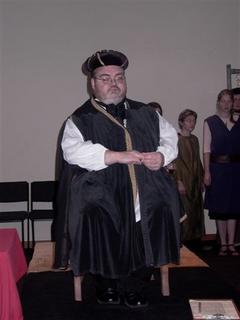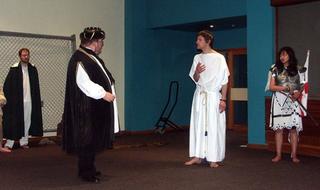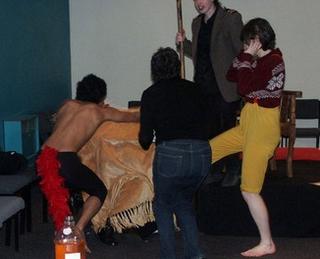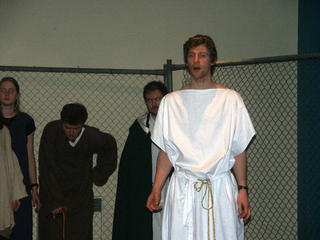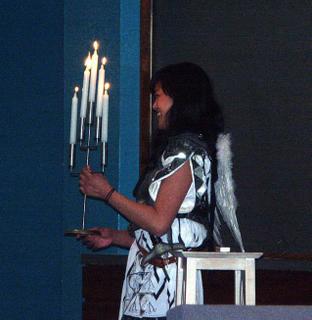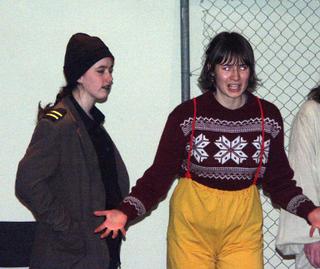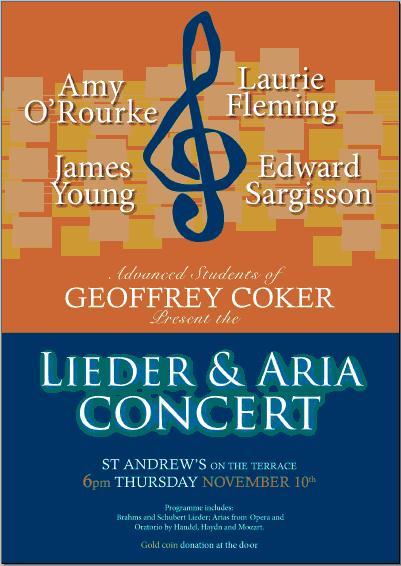Which is somewhat surreal when you consider that I lost it 3 months ago and the Lost Property boxes at the University all came up empty. It turned out that it had been handed into the English Department, thrown in a drawer and forgotten by somebody, and then found by somebody else who resourcefully swapped out the SIM card and called a random number from the Saved list. I am very grateful to the somebody else.
Oh, and I had an exam today. Is it a good sign if you get writer's cramp an hour in?
Stephanie
Monday, October 31, 2005
Wednesday, October 26, 2005
I Played Frisbee Last Night!
No, really, in an organised sports team and everything. Our team has several scarily good players and rabble. I'm rabble and I throw like a girl, but to my advantage is gender - there have to be two women on the field at all times so having extras who can sub for each other is a good thing. Also, it means getting out to a park on a summer evening and running around a lot which is lots of fun. It's also a friendly atmosphere - it's all about fun and sportsmanship and after each match the competing teams wander around shaking each others' hands and thanking them for the game. Several times this worked out as a receiving line effect - both teams ended up in queues working their way along the other queue. (If only I can teach them how to Hay!) Last night was the first in the season and was organised as a bunch of short matches so that the organisers can work out which grade everyone should be in. It was actually very interesting watching over the course of the evening our team's throwing skills and tactics improving. I think we'll be quite low on the rankings, but that means there's nowhere to go but up.
Monday, October 24, 2005
The Goss.
So, I'm now showered, sweet-smelling and in clean jammies. Also, some nice hot pizza is a mere 20 minutes away and I'm feeling very relaxed.
How has my week been? Work was busy in a good way. I finally figured out a way to solve a modelling problem that's been bugging my workmates for a while, although every time I try to explain it to people they get a little glazed about the eyes. Anyhow, I got a prototype knocked up last week and this week my project (along with study type stuff) is to get the code working and start testing it. But that's not the interesting part.
NAAMA
It was bitterly, bitterly cold. Every year I go I think that I've finally worked out how to dress properly and every year I find out I'm wrong. I have plans, however, for new and fine woolen dresses with flannel linings which will be the envy of everyone for next year, although improvising drapes with some material I bought at the market worked very well indeed also. (Thank you, I, Claudius.) Iwitahi's main virtue (Iwitahi Outdoor Education Camp near Taupo) is lots of very hot water in the showers and a very efficient fire in the Main Hall, which it needs, because it's up on the plateau and its version Labour Weekend weather seems to be Noah's Flood or winds that knock the breath out of you.
It was lots and lots of fun. I got to catch up with lots of old friends that I only see once a year, and met a whole heap of people that I hope will become friends shortly. Highlights: chilling out; making my very own leather pouch under the guidance of Jeremy of the Red Ravens (it rocks); singing with Sarah and the Christchurch SCA chick whose name I've forgotten; playing Stretch (that's Twister with throwing knives), much to the amusement of the spectators; playing Kubb with Jess (it's a game where you throw bits of wood at other bits of wood and my team lost lots); playing with other people's babies and being able to give them back afterwards (which is of course the most important part); wandering around the forestry trails and realising that it's not as bleak as I remember; and not dancing on tables (sorry Adam).
An anti-highlight was providing evening entertainment for my roommates by having a truly hideous nightmare. From my point of view, I woke at 2am on Monday morning convinced that the room was full of evil undead zombies who were planning to eat me. Or my soul, or something like that. Naturally, I fled. From my roommates' point of view, I suddenly screamed "Oh my God, NO!!!" and ran out the door, which is an impressive feat in a sleeping bag. Apparently I got several metres out the door before I fell over. (Ain't claustrophobia grand? I think it was waking up in a very dark room tied up in piles of sleeping bags and blankets and not being able to breathe properly because my nose was stuffed up.) Anyway, it turned out that the Main Hall was taking in refugees, so I spent the rest of the night there where it was nice and warm. Warm is good.
Hot pools are good, too. So is sitting on the grass at the airport watching planes take off and people jumping out of them. And winning the Riddle Competition (with help) with the prize of an extremely Un-Naff Notebook with a carved stone (?) cover. The riddle that I answered to win it was this:
A strange thing hangs by man's hip,
hidden by a garment. It has a hole
in its head. It is stiff and strong
and its firm bearing reaps a reward.
When the retainer hitches his clothing
high above his knee, he wants the head
of that hanging thing to find the old hole
that it, outstretched, has often filled before.
Any guesses?
Stephanie
How has my week been? Work was busy in a good way. I finally figured out a way to solve a modelling problem that's been bugging my workmates for a while, although every time I try to explain it to people they get a little glazed about the eyes. Anyhow, I got a prototype knocked up last week and this week my project (along with study type stuff) is to get the code working and start testing it. But that's not the interesting part.
NAAMA
It was bitterly, bitterly cold. Every year I go I think that I've finally worked out how to dress properly and every year I find out I'm wrong. I have plans, however, for new and fine woolen dresses with flannel linings which will be the envy of everyone for next year, although improvising drapes with some material I bought at the market worked very well indeed also. (Thank you, I, Claudius.) Iwitahi's main virtue (Iwitahi Outdoor Education Camp near Taupo) is lots of very hot water in the showers and a very efficient fire in the Main Hall, which it needs, because it's up on the plateau and its version Labour Weekend weather seems to be Noah's Flood or winds that knock the breath out of you.
It was lots and lots of fun. I got to catch up with lots of old friends that I only see once a year, and met a whole heap of people that I hope will become friends shortly. Highlights: chilling out; making my very own leather pouch under the guidance of Jeremy of the Red Ravens (it rocks); singing with Sarah and the Christchurch SCA chick whose name I've forgotten; playing Stretch (that's Twister with throwing knives), much to the amusement of the spectators; playing Kubb with Jess (it's a game where you throw bits of wood at other bits of wood and my team lost lots); playing with other people's babies and being able to give them back afterwards (which is of course the most important part); wandering around the forestry trails and realising that it's not as bleak as I remember; and not dancing on tables (sorry Adam).
An anti-highlight was providing evening entertainment for my roommates by having a truly hideous nightmare. From my point of view, I woke at 2am on Monday morning convinced that the room was full of evil undead zombies who were planning to eat me. Or my soul, or something like that. Naturally, I fled. From my roommates' point of view, I suddenly screamed "Oh my God, NO!!!" and ran out the door, which is an impressive feat in a sleeping bag. Apparently I got several metres out the door before I fell over. (Ain't claustrophobia grand? I think it was waking up in a very dark room tied up in piles of sleeping bags and blankets and not being able to breathe properly because my nose was stuffed up.) Anyway, it turned out that the Main Hall was taking in refugees, so I spent the rest of the night there where it was nice and warm. Warm is good.
Hot pools are good, too. So is sitting on the grass at the airport watching planes take off and people jumping out of them. And winning the Riddle Competition (with help) with the prize of an extremely Un-Naff Notebook with a carved stone (?) cover. The riddle that I answered to win it was this:
A strange thing hangs by man's hip,
hidden by a garment. It has a hole
in its head. It is stiff and strong
and its firm bearing reaps a reward.
When the retainer hitches his clothing
high above his knee, he wants the head
of that hanging thing to find the old hole
that it, outstretched, has often filled before.
Any guesses?
Stephanie
Labels:
NAAMA,
Re-enactment,
Riddles,
Weather
Tuesday, October 11, 2005
Harrowing Pictures, Part 3
Sunday, October 09, 2005
Review: Anansi Boys
First off, this book is dedicated to me. Me, me, me. Gosh, how did Mr Gaiman know I’d always secretly wanted to be the subject of a book dedication? It made my whole day! Anyway, on to the review.
A friend once suggested to me that Aristophanes was a funnier writer than Shakespeare because, in addition to Sex Jokes and Gender-Changing Jokes, Aristophanes had also mastered the Fart Joke. So has Neil Gaiman. I’m not kidding here – early in the piece is a very long and elaborately told joke that refers to an old woman ‘flatulating’ as just one more of its precisely crude details. In fact, the whole book is littered with the commonplaces and little embarrassments of life: hair mayonnaise and turning up late to your father’s funeral and the shriek of a cat being shampooed. Why do I think this is worth mentioning? Because this is a story about gods and the myths that they wear, and amongst the minutiae of real life is the bitter taste of funeral wine, flavoured with aloes and rosemary, and the tears of broken-hearted virgins. The commonplaces give us, the humble readers, something to identify with, a way into the story, and a place to rest from the larger events of the story quietly gleaming behind them.
Anansi Boys is a lighter book than American Gods, the sort-of prequel. This doesn’t make it light-weight, but it floats more softly over the dark undercurrents of Gaiman’s mythology. American Gods dug right in to issues of transplantation and how to live in an alien country, an epic battle between entire pantheons of gods and the death and resurrection of the son of a god, always a powerful story, whichever god it might happen to be. Anansi Boys, suitable to the tale of a trickster god, is more about a private spat, and the horribly excruciating embarrassment that one’s parents can be. Gaiman still brings out the sense of separation from one’s point of origin, particularly for Fat Charlie, born in Florida to transplanted parents who was himself transplanted to London and who remade himself so successfully that his entire accent changed. However, while many characters are either living in different places than where they were born, or are the children of such parents, it is a more subtle feature than the set-piece descriptions of the arrival and failure of different colonisation expeditions that were a repeating motif in American Gods. (One of the thumbs up aspects of Anansi Boys is not just that Gaiman never assumes that characters will by default be Caucasian, but that he delays mentioning what ethnic background his characters have until we’ve already been introduced to them and gotten to know them a little (or a lot) first. For Gaiman, race is part of his characters’ identity, but it is not the thing that defines them. He gets another thumbs up for writing different dialects convincingly without resorting to phonetic spelling, which to me is more annoyance than it’s worth.)
It is also a story of integration. Fat Charlie at the beginning of the book is, in many ways, not whole. He clings to a bad job and a not-right relationship because they give him a sense of identity that he can’t provide for himself. His brother Spider, who at first sight seems to have it all, is also lacking a sense of completeness. The meeting of their antithetical personalities brings, as one would expect, an enormous clash – matter meets anti-matter kind of thing - that threatens to destroy Fat Charlie’s life and, more subtly, Spider’s as well. Over the course of the book, Spider’s personality seems more and more fragile, and I was never quite sure how much of the fragility came from crashing against the rock that was Charlie and how much was always there, hiding beneath his flamboyant outer persona. How the two brothers will resolve this conflict is the central theme of the book. Other writers have addressed this kind of Jungian division; for instance, Ursula LeGuin, who resolved it with the wizard Ged absorbing his own shadow personality in A Wizard of Earthsea by naming it as himself. Here, names are also an issue – Fat Charlie was named so by his father Anansi and spent his life trying to escape it. His means of growing out of his nickname, as his means of growing into his identity and coping both with his father’s death and the existence of his strange and fickle brother is wholly right.
This is a finely crafted story. Many of the minor details come around again later in the book in ways that are meaningful to the whole and not jarring to the reader. The story thrives on co-incidences and the surreal Just Because-ness of a fairy tale. Gaiman juggles the multiple threads of the tale so that they spiral together into the delicate pattern of a spider’s web. Without going into too much detail for those that haven’t read it yet, the end of the story shows the web completed. Gaiman comments in an interview at the end of the book that “in horror fiction people get what they deserve, whereas in comedies people get what they need.” In this story, both definitions apply, everybody ends up precisely where they ought to be.
A friend once suggested to me that Aristophanes was a funnier writer than Shakespeare because, in addition to Sex Jokes and Gender-Changing Jokes, Aristophanes had also mastered the Fart Joke. So has Neil Gaiman. I’m not kidding here – early in the piece is a very long and elaborately told joke that refers to an old woman ‘flatulating’ as just one more of its precisely crude details. In fact, the whole book is littered with the commonplaces and little embarrassments of life: hair mayonnaise and turning up late to your father’s funeral and the shriek of a cat being shampooed. Why do I think this is worth mentioning? Because this is a story about gods and the myths that they wear, and amongst the minutiae of real life is the bitter taste of funeral wine, flavoured with aloes and rosemary, and the tears of broken-hearted virgins. The commonplaces give us, the humble readers, something to identify with, a way into the story, and a place to rest from the larger events of the story quietly gleaming behind them.
Anansi Boys is a lighter book than American Gods, the sort-of prequel. This doesn’t make it light-weight, but it floats more softly over the dark undercurrents of Gaiman’s mythology. American Gods dug right in to issues of transplantation and how to live in an alien country, an epic battle between entire pantheons of gods and the death and resurrection of the son of a god, always a powerful story, whichever god it might happen to be. Anansi Boys, suitable to the tale of a trickster god, is more about a private spat, and the horribly excruciating embarrassment that one’s parents can be. Gaiman still brings out the sense of separation from one’s point of origin, particularly for Fat Charlie, born in Florida to transplanted parents who was himself transplanted to London and who remade himself so successfully that his entire accent changed. However, while many characters are either living in different places than where they were born, or are the children of such parents, it is a more subtle feature than the set-piece descriptions of the arrival and failure of different colonisation expeditions that were a repeating motif in American Gods. (One of the thumbs up aspects of Anansi Boys is not just that Gaiman never assumes that characters will by default be Caucasian, but that he delays mentioning what ethnic background his characters have until we’ve already been introduced to them and gotten to know them a little (or a lot) first. For Gaiman, race is part of his characters’ identity, but it is not the thing that defines them. He gets another thumbs up for writing different dialects convincingly without resorting to phonetic spelling, which to me is more annoyance than it’s worth.)
It is also a story of integration. Fat Charlie at the beginning of the book is, in many ways, not whole. He clings to a bad job and a not-right relationship because they give him a sense of identity that he can’t provide for himself. His brother Spider, who at first sight seems to have it all, is also lacking a sense of completeness. The meeting of their antithetical personalities brings, as one would expect, an enormous clash – matter meets anti-matter kind of thing - that threatens to destroy Fat Charlie’s life and, more subtly, Spider’s as well. Over the course of the book, Spider’s personality seems more and more fragile, and I was never quite sure how much of the fragility came from crashing against the rock that was Charlie and how much was always there, hiding beneath his flamboyant outer persona. How the two brothers will resolve this conflict is the central theme of the book. Other writers have addressed this kind of Jungian division; for instance, Ursula LeGuin, who resolved it with the wizard Ged absorbing his own shadow personality in A Wizard of Earthsea by naming it as himself. Here, names are also an issue – Fat Charlie was named so by his father Anansi and spent his life trying to escape it. His means of growing out of his nickname, as his means of growing into his identity and coping both with his father’s death and the existence of his strange and fickle brother is wholly right.
This is a finely crafted story. Many of the minor details come around again later in the book in ways that are meaningful to the whole and not jarring to the reader. The story thrives on co-incidences and the surreal Just Because-ness of a fairy tale. Gaiman juggles the multiple threads of the tale so that they spiral together into the delicate pattern of a spider’s web. Without going into too much detail for those that haven’t read it yet, the end of the story shows the web completed. Gaiman comments in an interview at the end of the book that “in horror fiction people get what they deserve, whereas in comedies people get what they need.” In this story, both definitions apply, everybody ends up precisely where they ought to be.
Saturday, October 08, 2005
Harrowing Pictures, Part 1
Friday, October 07, 2005
Advertisement - Lieder and Aria Concert
Wednesday, October 05, 2005
Poems R Us - The Second Wave
I've been feeling a little bit homesick lately in a very non-specific, not exactly sure what I want, kind of way. (Having said that, this evening which consisted of turning up to WARGS, concluding that nobody really wanted to play board games that much and repairing to a cafe for a chat helped a lot.)
My beta reader has pointed out that most people will not get some of the references in this poem, to which I say “Suffer”. You don’t have to read it if you don’t want to.
On Feeling Homesick,
I Pause To Reflect That Going Backwards Can,
At Times, Be Difficult.
In my life there was no flood,
no fire, no grand catastrophe.
There are no disaster pictures
of the demolished ruins of my home.
Instead, it sliced itself away
in pieces.
There is no place for me now
in that house where I was born.
Or the next, where a charred grapevine
clung grimly to the wall, nor even
that house where from the garden
I ripped stubborn roots
in the grey winter that my father died.
My life moves on, it moves on,
and fickle time will go forward,
despite the best of intentions,
and manners.
What is left to me now
is the walk home
down a cool hill side
and the shy smile of Mr Patel,
the man at the dairy.
-- Stephanie Pegg, October 2005.
My beta reader has pointed out that most people will not get some of the references in this poem, to which I say “Suffer”. You don’t have to read it if you don’t want to.
On Feeling Homesick,
I Pause To Reflect That Going Backwards Can,
At Times, Be Difficult.
In my life there was no flood,
no fire, no grand catastrophe.
There are no disaster pictures
of the demolished ruins of my home.
Instead, it sliced itself away
in pieces.
There is no place for me now
in that house where I was born.
Or the next, where a charred grapevine
clung grimly to the wall, nor even
that house where from the garden
I ripped stubborn roots
in the grey winter that my father died.
My life moves on, it moves on,
and fickle time will go forward,
despite the best of intentions,
and manners.
What is left to me now
is the walk home
down a cool hill side
and the shy smile of Mr Patel,
the man at the dairy.
-- Stephanie Pegg, October 2005.
Subscribe to:
Comments (Atom)

